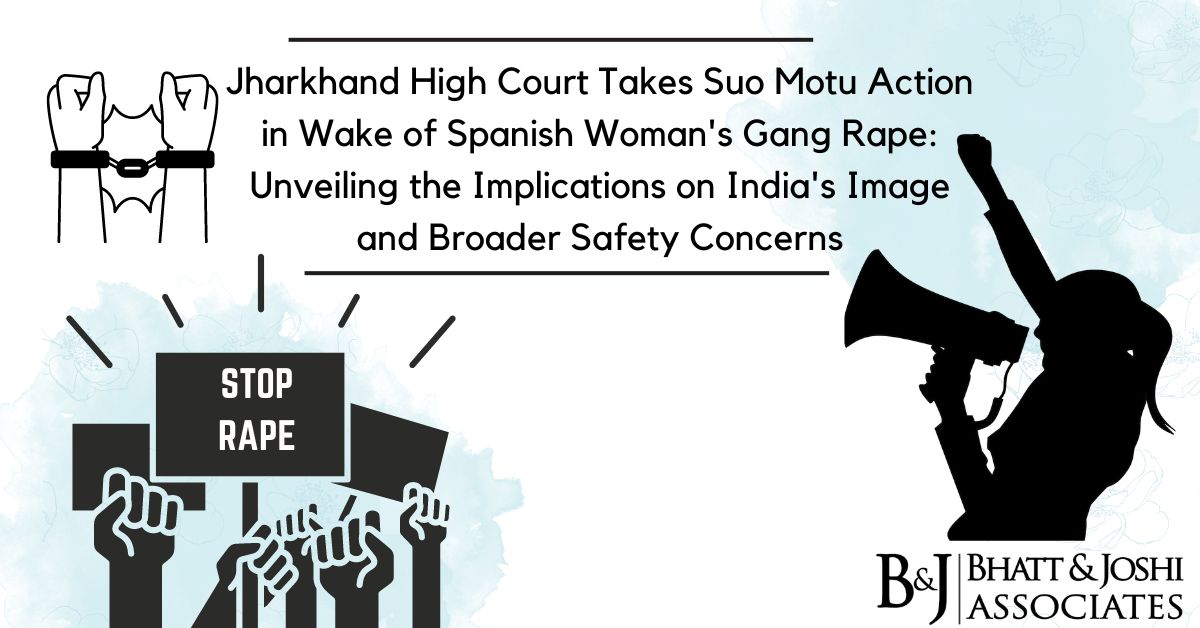Jharkhand High Court’s Suo Motu Intervention
In response to the horrifying gang rape of a Spanish woman in Dumka, the Jharkhand High Court has taken proactive cognizance of the incident. A Division Bench, led by Acting Chief Justice S. Chandrashekhar, has initiated a comprehensive inquiry, demanding reports from the Chief Secretary, Director-General of Police (DGP), and the Superintendent of Police (SP) of Dumka district, where the crime transpired.
Potential Impact on India’s Image
The court, cognizant of the potential consequences, has expressed grave concern over the adverse national and international repercussions that crimes against foreign nationals could bring. The fear is that such incidents may severely impact India’s tourism economy and lead to unfavorable publicity, tarnishing the country’s image globally.
Urgent Need for Investigation Update in Spanish Woman Gang Rape Case
In light of recent amendments in the Code of Criminal Procedure and the increased emphasis on scientific investigation in rape cases, the court has underscored the urgent need for a detailed progress report from SP Dumka. The absence of information regarding a translator during the victim’s statement recording raises questions about procedural aspects.
Details of the Heinous Crime: The Spanish Woman’s Gang Rape Incident
The gang rape unfolded during the bike tour of a Spanish-speaking woman, who also reportedly holds Brazilian citizenship, and her husband across India. The incident occurred when they were resting in tents at a deserted area in Kurmahat village, prompting concerns about the safety of tourists in the region.
Compensation Gesture and Ongoing Investigation in Spanish Woman Gang Rape Case
Dumka Deputy Commissioner Anjaneyulu Dodde has attempted a gesture of compensation by presenting a ₹10 lakh cheque to the victim’s husband. Simultaneously, efforts are underway to identify and apprehend four additional suspects in the case. Seven individuals are believed to be involved, with three already in custody.
Political Response and Protest
In response to the incident, the opposition BJP staged a protest march in Ranchi, vehemently condemning the government for the deteriorating law and order situation in the state. The party leaders assert that the gang rape has adversely affected Jharkhand’s global image.
Global Recognition and Image Tarnishing
Ranchi MP Sanjay Seth, echoing the sentiments of the BJP, expresses concern about the incident’s impact on Jharkhand’s reputation worldwide. This sentiment contradicts the positive global recognition India has been receiving under the leadership of Prime Minister Narendra Modi.
Parallel Incidents and Escalating Concerns
Amid the public outcry over the Spanish woman’s gang rape, the situation intensifies with reports of two more rape incidents in Jharkhand. These additional cases underscore broader concerns about the safety of women and raise questions about the efficiency of law enforcement in the state.
Broader Implications and Global Reputation Management
As the incident unfolds, it raises critical questions about the safety of women, the efficiency of law enforcement agencies, and the broader implications on India’s international standing. The court’s intervention signals a commitment to address the issue transparently, ensuring justice for the survivors and implementing measures to prevent such atrocities in the future.
Concluding Reflections: Responding to the Spanish Woman Gang Rape in Jharkhand
In conclusion, the Spanish woman gang rape case in Dumka, Jharkhand, stands as a stark reminder of the pressing issues surrounding women’s safety, law enforcement efficacy, and the broader implications for India’s global image. The proactive intervention of the Jharkhand High Court, led by Acting Chief Justice S. Chandrashekhar, underscores a commitment to transparency and justice in the face of such heinous crimes. However, as this incident unfolds, it lays bare the challenges in ensuring the safety and well-being of citizens and visitors alike.
The court’s demand for detailed reports from key officials, its emphasis on procedural scrutiny, and concerns about the potential impact on India’s tourism economy highlight the multifaceted nature of the issue. The absence of a translator during the victim’s statement recording further underscores the need for meticulous examination of procedural aspects in such sensitive cases.
The political fallout, with the opposition BJP staging protests and asserting damage to Jharkhand’s global image, adds a layer of complexity. Ranchi MP Sanjay Seth’s concerns echo a broader debate about India’s standing in the world under the leadership of Prime Minister Narendra Modi, revealing the delicate balance between international recognition and domestic challenges.
Moreover, the parallel incidents of rape reported during the aftermath of the Spanish woman’s assault amplify concerns about the safety of women in the region and raise critical questions about the efficiency of law enforcement agencies. The ongoing investigations, compensation gestures, and public outcry underscore the need for systemic changes to prevent such atrocities in the future.
As this tragic chapter continues to unfold, it serves as a call to action for policymakers, law enforcement authorities, and society at large to collectively address the root causes of such crimes, strengthen legal frameworks, and foster a safer environment for everyone. The court’s intervention is a step in the right direction, but sustained efforts are required to ensure justice, protect the vulnerable, and rebuild the trust that such incidents shatter within communities and on the global stage. Ultimately, the Spanish woman gang rape case in Jharkhand serves as a poignant reminder that safeguarding the dignity and security of every individual must be an unwavering priority for any society aspiring towards progress and justice.














